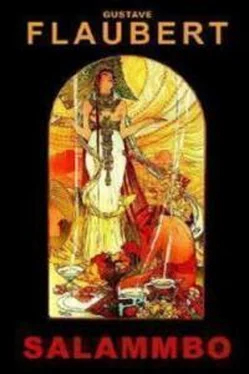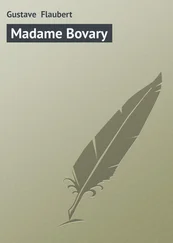But they perceived a little lake divided into several basins by walls of blue stones. So limpid was the wave that the flames of the torches quivered in it at the very bottom, on a bed of white pebbles and golden dust. It began to bubble, luminous spangles glided past, and great fish with gems about their mouths, appeared near the surface.
With much laughter the soldiers slipped their fingers into the gills and brought them to the tables. They were the fish of the Barca family, and were all descended from those primordial lotes which had hatched the mystic egg wherein the goddess was concealed. The idea of committing a sacrilege revived the greediness of the Mercenaries; they speedily placed fire beneath some brazen vases, and amused themselves by watching the beautiful fish struggling in the boiling water.
The surge of soldiers pressed on. They were no longer afraid. They commenced to drink again. Their ragged tunics were wet with the perfumes that flowed in large drops from their foreheads, and resting both fists on the tables, which seemed to them to be rocking like ships, they rolled their great drunken eyes around to devour by sight what they could not take. Others walked amid the dishes on the purple table covers, breaking ivory stools, and phials of Tyrian glass to pieces with their feet. Songs mingled with the death–rattle of the slaves expiring amid the broken cups. They demanded wine, meat, gold. They cried out for women. They raved in a hundred languages. Some thought that they were at the vapour baths on account of the steam which floated around them, or else, catching sight of the foliage, imagined that they were at the chase, and rushed upon their companions as upon wild beasts. The conflagration spread to all the trees, one after another, and the lofty mosses of verdure, emitting long white spirals, looked like volcanoes beginning to smoke. The clamour redoubled; the wounded lions roared in the shade.
In an instant the highest terrace of the palace was illuminated, the central door opened, and a woman, Hamilcar's daughter herself, clothed in black garments, appeared on the threshold. She descended the first staircase, which ran obliquely along the first story, then the second, and the third, and stopped on the last terrace at the head of the galley staircase. Motionless and with head bent, she gazed upon the soldiers.
Behind her, on each side, were two long shadows of pale men, clad in white, red–fringed robes, which fell straight to their feet. They had no beard, no hair, no eyebrows. In their hands, which sparkled with rings, they carried enormous lyres, and with shrill voice they sang a hymn to the divinity of Carthage. They were the eunuch priests of the temple of Tanith, who were often summoned by Salammbo to her house.
At last she descended the galley staircase. The priests followed her. She advanced into the avenue of cypress, and walked slowly through the tables of the captains, who drew back somewhat as they watched her pass.
Her hair, which was powdered with violet sand, and combined into the form of a tower, after the fashion of the Chanaanite maidens, added to her height. Tresses of pearls were fastened to her temples, and fell to the corners of her mouth, which was as rosy as a half–open pomegranate. On her breast was a collection of luminous stones, their variegation imitating the scales of the murena. Her arms were adorned with diamonds, and issued naked from her sleeveless tunic, which was starred with red flowers on a perfectly black ground. Between her ankles she wore a golden chainlet to regulate her steps, and her large dark purple mantle, cut of an unknown material, trailed behind her, making, as it were, at each step, a broad wave which followed her.
The priests played nearly stifled chords on their lyres from time to time, and in the intervals of the music might be heard the tinkling of the little golden chain, and the regular patter of her papyrus sandals.
No one as yet was acquainted with her. It was only known that she led a retired life, engaged in pious practices. Some soldiers had seen her in the night on the summit of her palace kneeling before the stars amid the eddyings from kindled perfuming–pans. It was the moon that had made her so pale, and there was something from the gods that enveloped her like a subtle vapour. Her eyes seemed to gaze far beyond terrestrial space. She bent her head as she walked, and in her right hand she carried a little ebony lyre.
They heard her murmur:
"Dead! All dead! No more will you come obedient to my voice as when, seated on the edge of the lake, I used to through seeds of the watermelon into your mouths! The mystery of Tanith ranged in the depths of your eyes that were more limpid than the globules of rivers." And she called them by their names, which were those of the months—"Siv! Sivan! Tammouz, Eloul, Tischri, Schebar! Ah! have pity on me, goddess!"
The soldiers thronged about her without understanding what she said. They wondered at her attire, but she turned a long frightened look upon them all, then sinking her head beneath her shoulders, and waving her arms, she repeated several times:
"What have you done? what have you done?
"Yet you had bread, and meats and oil, and all the malobathrum of the granaries for your enjoyment! I had brought oxen from Hecatompylos; I had sent hunters into the desert!" Her voice swelled; her cheeks purpled. She added, "Where, pray, are you now? In a conquered town, or in the palace of a master? And what master? Hamilcar the Suffet, my father, the servant of the Baals! It was he who withheld from Lutatius those arms of yours, red now with the blood of his slaves! Know you of any in your own lands more skilled in the conduct of battles? Look! our palace steps are encumbered with our victories! Ah! desist not! burn it! I will carry away with me the genius of my house, my black serpent slumbering up yonder on lotus leaves! I will whistle and he will follow me, and if I embark in a galley he will speed in the wake of my ship over the foam of the waves."
Her delicate nostrils were quivering. She crushed her nails against the gems on her bosom. Her eyes drooped, and she resumed:
"Ah! poor Carthage! lamentable city! No longer hast thou for thy protection the strong men of former days who went beyond the oceans to build temples on their shores. All the lands laboured about thee, and the sea–plains, ploughed by thine oars, rocked with thy harvests." Then she began to sing the adventures of Melkarth, the god of the Sidonians, and the father of her family.
She told of the ascent of the mountains of Ersiphonia, the journey to Tartessus, and the war against Masisabal to avenge the queen of the serpents:
"He pursued the female monster, whose tail undulated over the dead leaves like a silver brook, into the forest, and came to a plain where women with dragon–croups were round a great fire, standing erect on the points of their tails. The blood–coloured moon was shining within a pale circle, and their scarlet tongues, cloven like the harpoons of fishermen, reached curling forth to the very edge of the flame."
Then Salammbo, without pausing, related how Melkarth, after vanquishing Masisabal, placed her severed head on the prow of his ship. "At each throb of the waves it sank beneath the foam, but the sun embalmed it; it became harder than gold; nevertheless the eyes ceased not to weep, and the tears fell into the water continually."
She sang all this in an old Chanaanite idiom, which the Barbarians did not understand. They asked one another what she could be saying to them with those frightful gestures which accompanied her speech, and mounted round about her on the tables, beds, and sycamore boughs, they strove with open mouths and craned necks to grasp the vague stories hovering before their imaginations, through the dimness of the theogonies, like phantoms wrapped in cloud.
Читать дальше









![Гюстав Флобер - Закат Карфагена [Сборник]](/books/414440/gyustav-flober-zakat-karfagena-sbornik-thumb.webp)
